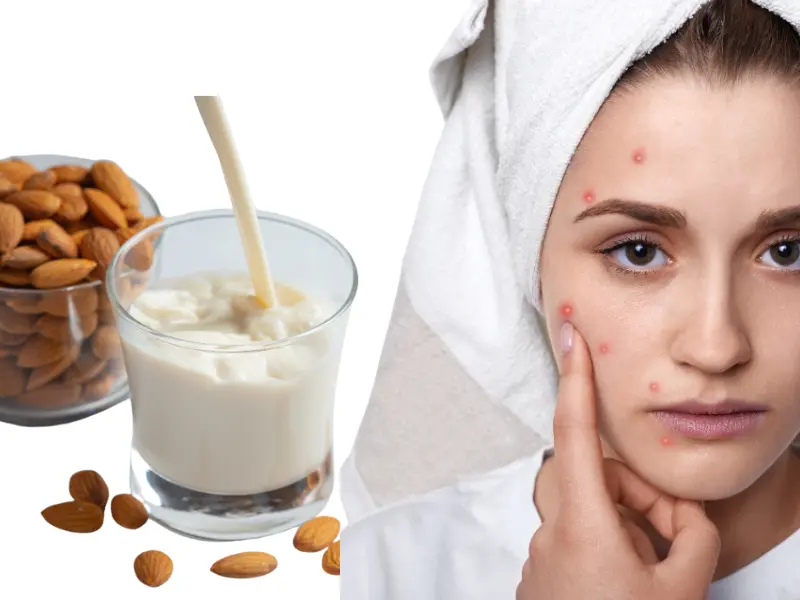Does Almond Milk Cause Acne?
Published: 26 Mar 2025
You switched to almond milk, thinking it was the healthier choice, but suddenly, breakouts started popping up. Could this innocent-looking drink be secretly causing acne? Many people are confused about whether almond milk helps or harms their skin, and with so much conflicting advice online, it’s hard to know what’s true.
Let’s break it down with science, expert insights, and real-life experiences to uncover the truth. By the end, you’ll know if almond milk is a friend or foe for your skin.
1- Can Almond Milk Really Cause Acne? Let’s Find Out!
Many people also relate acne to other foods, such as mangoes, bananas, spicy meals, rice, eggs, dairy, junk food or even peanut butter.
Let’s see whether the almond milk is the acne trigger or if it is only a myth.

1.1 Are Nut Sensitivities Secretly Wrecking Your Skin?
Some people have mild nut sensitivities that don’t cause full-blown allergic reactions but still lead to inflammation. Skin inflammation can make acne worse, especially for those with sensitive or reactive skin.

If you notice redness, itching, or small breakouts after consuming almonds or almond-based products, your skin might be reacting to a sensitivity.
1.2 Hidden Sugars in Almond Milk: Acne’s Silent Enemy?
Many store-bought almond milk brands contain added sugars, which can spike insulin levels. High insulin levels increase sebum (oil) production and inflammation, two key factors in acne.

Studies show that high-glycemic foods (like sugar) are linked to acne breakouts. Opting for unsweetened almond milk can help reduce this risk (1)
1.3 Do Almonds Mess With Your Hormones and Skin?
Almonds contain phytoestrogens, plant compounds that can mimic estrogen in the body. Some theories suggest this could affect hormonal balance, potentially influencing acne.

But is it a big deal? For most people, the amount of phytoestrogens in almonds is too low to cause noticeable hormonal changes. However, those with hormonal acne may want to observe how their skin reacts.
Ever checked what’s really hiding in your almond milk? Let’s dig deeper below!
1.4 The Hidden Additives in Almond Milk That Could Hurt Your Skin
Many commercial almond milk brands contain emulsifiers (like carrageenan and lecithin) to improve texture and shelf life. (2) These additives may:
✅ Disrupts gut microbiome balance
✅ Increases inflammation
✅ Worsen skin conditions like acne
Look for clean-label almond milk with minimal ingredients, or try homemade almond milk for a healthier option.
2- Should You Give Up Almond Milk for Clearer Skin?
Not necessarily! If you have acne-prone skin but love almond milk, opt for:
✅ Unsweetened & preservative-free brands
✅ Homemade almond milk (to control ingredients)
✅ Listen to your skin—if you notice breakouts, try swapping it for another alternative.
Not sure which almond milk to pick? Stick around. I’ll share my personal go-to choices next.
| 3- How to Pick the Best Almond Milk Without Breaking Out |
|---|
Not all almond milk is created equal! If you want to enjoy it without worrying about breakouts, here’s what to look for: 3.1 Opt for Unsweetened Versions
Flavoured almond milks (like vanilla or chocolate) often have more sugar, so always check the label! 3.2 Check Ingredient Labels Carefully
Look for Almond milk with just almonds, water, and maybe a little salt. 3.3 Choose Organic Brands with Minimal Additives
Organic almond milk with minimal ingredients for a cleaner, skin-friendly choice. |
Still wondering if your favourite foods are messing with your skin? Dive deeper with our latest skin-friendly diet tips, your future clear skin will thank you!
4- Final Thoughts: Is Almond Milk a Friend or Foe for Your Skin?
So, guys, in this article, we’ve covered “Does Almond Milk Cause Acne?” in detail. While there’s no solid scientific proof linking almond milk to breakouts, certain ingredients, like added sugars and preservatives, could be potential triggers for some people.
If you suspect it’s affecting your skin, try switching to unsweetened versions or alternative plant-based milks. My recommendation? Keep a simple food diary, track any skin changes, and focus on a balanced diet for overall skin health.
Found this helpful? Share it with your friends
5- FAQs
Not necessarily! Almond milk itself isn’t a common acne trigger, but some ingredients—like added sugars, emulsifiers, and preservatives—can cause breakouts. If you have nut sensitivities, almonds may also trigger skin inflammation.
Yes! If you’re allergic or sensitive to nuts, drinking almond milk might trigger inflammation, redness, or breakouts. Even if you’re not allergic, some people’s skin reacts negatively to nuts due to their omega-6 fatty acids.
Almonds contain phytoestrogens, which act like weak estrogens in the body. While they’re unlikely to cause major hormone changes, some people with hormonal acne might notice flare-ups. If you suspect this, try switching to another plant-based milk like coconut or oat.
In most cases, yes! Dairy contains hormones and IGF-1 (insulin-like growth factor), which can increase oil production and acne. Almond milk is a great alternative, but only if you choose an unsweetened, clean-ingredient version.
Absolutely! Added sugars spike blood sugar and insulin levels, which can lead to more oil production and clogged pores. Always choose unsweetened almond milk to avoid this risk.
Watch out for carrageenan, gums, artificial flavors, and preservatives—they may irritate your gut and skin. Also, avoid almond milk with added sugars or synthetic vitamins like D2 (instead of D3). The fewer ingredients, the better!
Try an elimination test! Stop drinking almond milk for 2-4 weeks and see if your skin improves. If your acne clears up, almond milk (or certain ingredients in it) could be the culprit.
Look for unsweetened, organic almond milk with minimal ingredients—ideally just almonds, water, and salt. Homemade almond milk is even better because it’s fresh, clean, and free from additives.
If almond milk doesn’t work for you, try coconut milk, oat milk, or hemp milk. They’re naturally dairy-free and less likely to trigger acne compared to cow’s milk or high-sugar plant milks.
Yes! Just make sure to choose the right type—unsweetened, additive-free, and preferably organic. If you notice acne flare-ups, try switching to another plant-based milk and see if your skin improves.
6- References
At MedicaWire, all medically sensitive content is reviewed by licensed healthcare professionals. Our team ensures that the information you read is accurate, up-to-date, and based on trusted medical sources.
Learn how we maintain high standards by reading our Editorial Policy.
📚 Sources
- Milk Consumption and Acne Development: This meta-analysis found a positive relationship between dairy intake, including milk, and acne occurrence. https://www.sciencedirect.com/science/article/abs/pii/S0261561418301663
- Association Between Adult Acne and Dietary Behaviors: This study observed that consumption of milk, sugary beverages, and fatty and sugary products appeared to be associated with current acne in adults.
https://pubmed.ncbi.nlm.nih.gov/32520303 - Endocrine-Disrupting Chemicals, Hormone Receptors, and Acne: This review discusses how phytoestrogens, like those found in almonds, may interact with androgen signaling pathways, potentially influencing acne development.
https://pmc.ncbi.nlm.nih.gov/articles/PMC8228950 - The Pros and Cons of Phytoestrogens: This article examines the mixed and often conflicting results of studies on the impact of phytoestrogens on human health.
https://pmc.ncbi.nlm.nih.gov/articles/PMC3074428 - Carrageenan in Skin Care: What It Is & How It Works: This source discusses the comedogenic potential of carrageenan, suggesting it can clog pores and lead to acne.
https://skintypesolutions.com/blogs/skincare/carrageenan?srsltid=AfmBOoqqzBujNXmCdyCbx2hZhb_iHK0GOic5PnECZuw2umq7kBOd_0OM - Phytoestrogens: Benefits, Risks, and Food List: This article provides an overview of phytoestrogens, their potential health benefits, and their risks.
https://www.medicalnewstoday.com/articles/320630
ℹ️ Our Promise
MedicaWire follows strict sourcing guidelines and only references peer-reviewed studies, academic institutions, and reputable medical associations. We update content regularly to reflect new health information.

- Be Respectful
- Stay Relevant
- Stay Positive
- True Feedback
- Encourage Discussion
- Avoid Spamming
- No Fake News
- Don't Copy-Paste
- No Personal Attacks



- Be Respectful
- Stay Relevant
- Stay Positive
- True Feedback
- Encourage Discussion
- Avoid Spamming
- No Fake News
- Don't Copy-Paste
- No Personal Attacks




